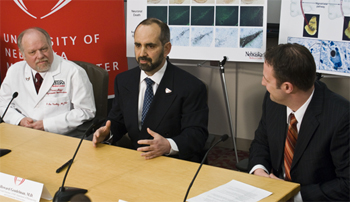UNMC researchers have taken a significant step forward in the development of a vaccine to reverse the neurological damage caused by Parkinson’s disease.
The findings appear in the March 1 issue of the Journal of Immunology.
“This could be a revolutionary means for Parkinson’s disease therapeutics,” said Howard Gendelman, M.D., chairman of the department of pharmacology and experimental neuroscience (PEN), who partnered with R. Lee Mosley, Ph.D., to lead the research. “It has been a long journey representing more than 10 years of hard work by our research team.”
 |
Howard Gendelman, M.D., center, discusses his team’s Parkinson’s vaccine while R. Lee Mosley, Ph.D., left, and Michael Dixon, Ph.D., look on. Drs. Gendelman and Mosley led the development of a vaccine that has been able to halt Parkinson’s disease in mice. (Andrew E. Nelson, UNMC public relations) |
Neurodegeneration occurs when a normal protein called alpha synuclein clumps, changes shape, then accumulates in the brain. This results in the body attacking it through inflammation and causing destruction of dopamine-producing nerve cells.
UNMC researchers reversed the neurodegenerative effects of alpha synuclein by changing immune responses to it.
In mice with an experimental form of Parkinson’s disease, researchers found that the vaccine enabled T cells to migrate to the damaged area of the brain and triggered a neuroprotective response that reduced disease-linked reactions in the brain.
T cells are white blood cells that are key to immune response. They act like soldiers who search out and destroy the targeted invaders.
|
Human studies are being conducted at the University of Alabama-Birmingham and within the next month at UNMC to determine if the immune deficits seen in mice also are present in humans with Parkinson’s disease. For more information on the UNMC portion of this study, call 402-559-6941.
“Early results are encouraging,” said Dr. Mosley, an associate professor in the PEN department, who noted that the research could open new doors for treatment of Parkinson’s and other neurodegenerative disorders.
UNMC’s technology transfer company, UNeMed, has filed a patent application on the vaccine and soon will talk to commercial partners about bringing the vaccine to the clinical setting.
Dr. Gendelman and his team are to be congratulated for their important insights as to why dopamine-producing cells die and how to rescue these cells, which are the pathological hallmark in Parkinson’s disease. This seminal work is extremely significant since it provides a cogent rationale for immune-based strategies in human Parkinson’s disease and a unique and important opportunity to develop novel neuroprotective therapies.
I think this work is really important. The studies in this new report, along with other data from the Gendelman group, our own lab, and others are leading to a completely new way of thinking about the role of immunity in PD. The new information points to a central role of the immune system as a causative element of the Parkinson degenerative process. This work leads to the idea that it might be possible to develop a vaccine which could alter immune responses in human PD and slow or prevent the progression of Parkinson’s disease. This concept would most likely have been dismissed as a ‘crazy idea’ just a few years ago, but these studies put the proposal on solid scientific footing. If we can confirm Dr. Gendelman’s findings in humans, this would open the door to an important new class of therapies for Parkinson’s disease.
This discovery has the potential to impact millions of people affected by Parkinson's disease. We are very enthusiastic about finding a company to help bring this technology through the clinic.
As a treating physician, using medications or surgical interventions to manage the disabling symptoms of Parkinson’s disease is rewarding. But having the possibility to alter the course of the disease would be revolutionary. The successful approach to a vaccine in a mouse model of Parkinson’s disease opens new treatment horizons. If eventually proven to have similar effectiveness in humans, such a vaccine could dramatically change what can be done about Parkinson’s disease. I am proud of our efforts at UNMC to treat and find a cure for Parkinson’s disease and other movement disorders.
Tonight, for the first time in 10 years, I'll go to sleep with more hope than fear.
This is great work. As somone who has had PD for over ten years, I look forward to a major milestone in disease management; after all, the discovery of Ldopa occurred over 40 years ago. As MJ Fox said "..we are not tying our ties any faster in the morning.."